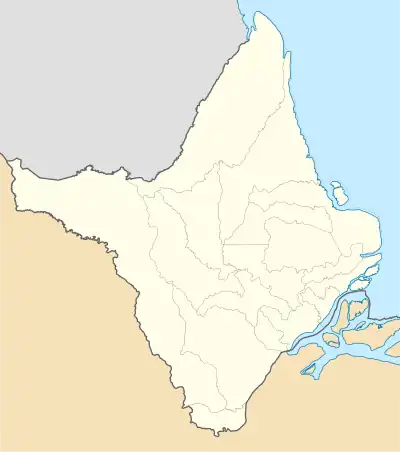Clevelândia do Norte | |
|---|---|
District and village | |
 Clevelândia do Norte Location in Brazil  Clevelândia do Norte Clevelândia do Norte (Brazil) | |
| Coordinates: 3°48′51″N 51°51′56″W / 3.8142°N 51.8655°W | |
| Country | |
| Region | North |
| State | Amapá |
| Municipality | Oiapoque |
| Population (2010)[1] | |
| • Total | 1,253 |
| Time zone | UTC−3 (BRT) |
Clevelândia do Norte is a district of the Brazilian city of Oiapoque, Amapá, by the Oyapock River.[2]
History
In 1922 an agricultural outpost called the Núcleo Colonial Cleveland was transformed into a political and criminal concentration camp during the presidency of Arthur Bernardes (1922–1926). Many Brazilian anarchist militants were sentenced to hard labour here. Of the 946 prisoners interned at Clevelândia between 1924 and 1927, 491 died. Many of the survivors returned to São Paulo and Rio de Janeiro permanently sickened with malaria.[3]
Since 1940, the 34th Infantry Battalion of Selva is stationed at Clevelândia do Norte.[4]
Vila Brasil
The village of Vila Brasil is located in the district on the Oiapoque River opposite Camopi, French Guiana. The village is inside the Tumucumaque Mountains National Park. Vila Brasil was founded in the 1930s as a tiny hamlet around the post of the Indian Protection Service.[5]
In the 1980s, it developed into a commercial centre catering to the French town of Camopi, because of significantly lower prices.[6] In 2002, the Tumucumaque Mountains National Park was created, and even though the area was supposed to be uninhabited, it was decided to allow the village.[5] In 2019, the population was estimated at about 200 people.[7]
Ilha Bela
Later, the village of Ilha Bela emerged next to Vila Brasil as a garimpeiros (illegal gold prospector) settlement.[5] The population was estimated at almost 400 people in 2019.[7] The village operates a safe haven for the gold prospectors who do their exploration in French Guiana.[5] The French 3rd Foreign Infantry Regiment has been stationed across the river to protect the border and prevent gold exploration.[8] Ilha Bela was raided by the Brazilian police and army in May 2019, however everybody had left the village, and only supplies were confiscated.[7]
References
- ↑ "Sinopse por setores". Instituto Brasileiro de Geografia e Estatística (in Portuguese). 16 November 2011. Retrieved 30 March 2021.
- ↑ "Clevelandia do Norte". MapCarta. Retrieved 3 April 2013.
- ↑ Romani, Carlo. "Clevelândia (Oiapoque): colônia penal ou campo de concentração?". Verve: Revista semestral autogestionária do Nu-Sol (in Portuguese). Núcleo de Sociabilidade Libertária do Programa de Estudos Pós-Graduados em Ciências Sociais da PUC-SP. 2003 (3): 112–130. Retrieved 27 March 2021.
- ↑ "Clevelândia do Norte (AP), completa 80 anos de história". Eco Amazonia (in Portuguese). 19 June 2020. Retrieved 30 March 2021.
- 1 2 3 4 "Vila Brasil, vilarejo de comerciantes no meio da floresta Amazônica". World Wide Found for Nature Brazil (in Portuguese). Retrieved 31 March 2021.
- ↑ Tritsch, Isabelle; Gond, Valéry; Oszwald, Johan; Davy, Damien; Grenand, Pierre (2021). "Dynamiques territoriales des Amérindiens wayãpi et teko du moyen Oyapock, Camopi, Guyane française". Bois & Forêts des Tropiques (in French). 311 (311): 53. doi:10.19182/bft2012.311.a20510.
- 1 2 3 "Brésil : fermeture d'un lieu de prostitution et saisies de carburant et de matériel de sonorisation à Vila Brasil". France TV Info (in French). Retrieved 31 March 2021.
- ↑ "Camopi". Americas FR. Retrieved 31 March 2021.